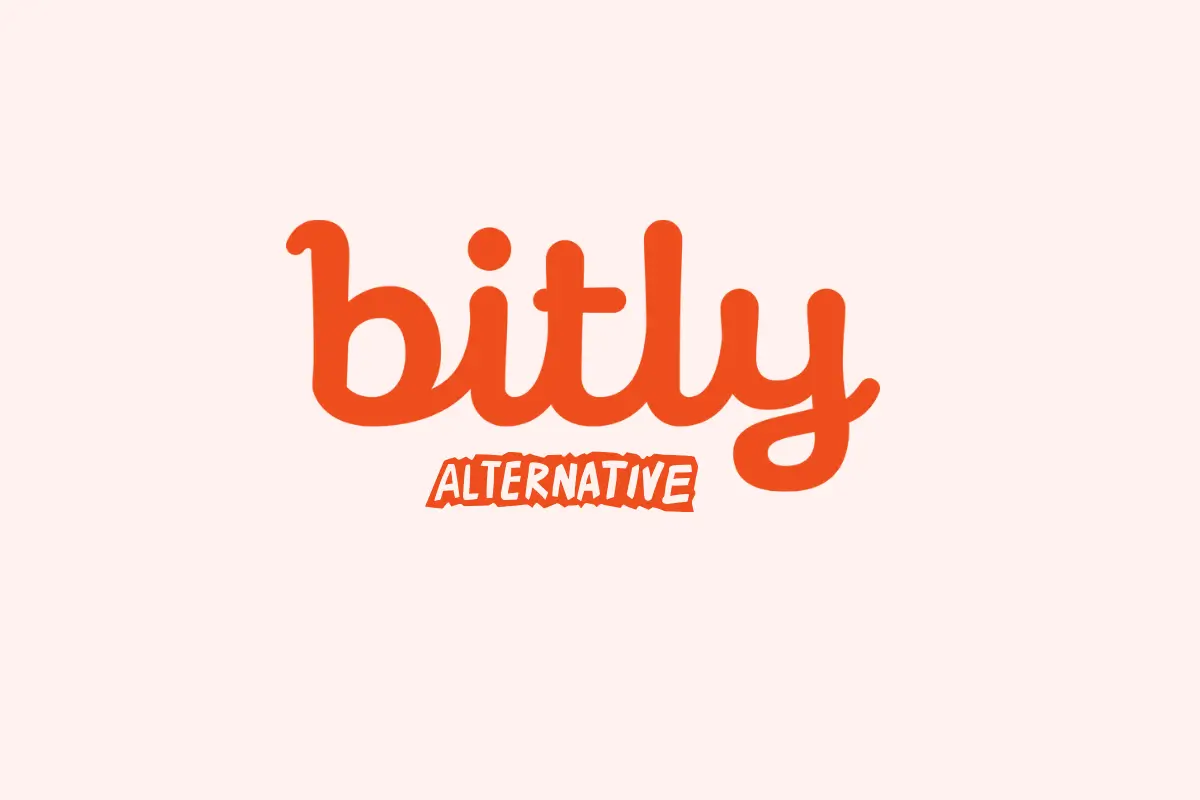When it comes to URL shorteners, Bitly is often the first name that pops up. It’s been around for years and offers a solid, easy-to-use platform for shrinking links.
However, as marketing needs have grown more complex, businesses like yours are starting to look beyond just basic link shortening. You might need more customization, better analytics, improved branding, or even more affordable plans that fit your scaling strategy.
This is where exploring Bitly alternatives becomes incredibly valuable. Whether you’re after advanced features, better pricing, or simple flexibility, there are plenty of powerful options out there.
In this blog, we are going to take a closer look at some of the top Bitly alternatives available today. We’ll cover what makes them stand out and help you find the one that aligns best with your marketing goals and business needs.
Why Look for a Bitly Alternative?
Bitly is a fantastic tool, but it doesn’t always meet all the requirements, especially for growing businesses with evolving needs. One major reason you might seek an alternative is cost.
Bitly’s free plan is limited, and premium options can get pricey quickly. If you’re looking for features like branded links or detailed analytics, you might feel boxed into an expensive plan.
Another factor is customization. Not every brand wants to use a generic shortlink. Having full control over branding is becoming more important for brand visibility and trust.
Data privacy and deeper integration options are also driving many businesses to explore competitors. Some alternatives offer better security, GDPR compliance, and seamless API integrations with marketing stacks.
Ultimately, the goal is to find a platform that grows with your business, offering the flexibility and features you actually need without charging for extras you don’t need.
Key Features to Consider When Choosing a URL Shortener
Before jumping into alternatives, it’s important to know what features truly matter. Here’s a quick guide to the key elements to look for when choosing a URL shortener:
- Custom Branding: Look for platforms that allow you to create branded links with your own domain, building trust and reinforcing your brand image with every click.
- Advanced Analytics: Detailed tracking, including click-through rates, geographic data, device type, and referral sources, is essential for measuring campaign performance effectively.
- Link Management Tools: Features like link editing, expiration dates, link previews, and bulk link management can save time and keep your campaigns organized.
- Integrations and API Access: Choosing a shortener that connects easily with your CRM, email marketing software, or other tools can streamline your workflow and boost productivity.
- Security and Compliance: SSL encryption, GDPR compliance, and password-protected links help protect your users’ data and maintain your brand’s credibility.
- Pricing Flexibility: It’s important to have options that scale with your business growth. Ideally, you want a platform that offers good value without forcing an expensive commitment upfront.
Top Bitly Alternatives
There’s no shortage of Bitly alternatives out there, but not all URL shorteners are created equal. Let’s dive into some of the top options you can consider for your business.
Tnye
Tnye is an emerging URL shortener that’s making waves by offering more than just basic link shortening. It blends simplicity with a variety of useful tools that cater to modern marketing needs.
Tnye is built for businesses that want easy link management, QR code creation, and other utilities like deep linking and binary conversion, all under one roof.
Key Features
Tnye comes packed with helpful tools, including link analytics, QR code generation, password-protected links, and even DNS lookup services.
It supports branded short domains, giving you complete control over your brand image every time a customer clicks a link.
Another standout feature is deep linking, which allows you to send users directly into app content rather than just a landing page, improving conversion rates.
Pricing and Ideal Users
Tnye offers competitive pricing that is great for startups and small businesses that want flexibility without breaking the bank.
Its freemium plan covers the basics, while paid plans unlock more integrations and deeper customization options.
It’s ideal for businesses looking for a broader toolset along with a powerful URL shortener, without paying enterprise-level prices.
Possible Drawbacks
Tnye is still expanding its list of third-party integrations, so if you need seamless connectivity with every app in your tech stack, you may want to double-check current compatibility.
Additionally, while the platform is easy to use, businesses with highly complex needs might prefer a more mature platform with decades of backend development.
Rebrandly
Rebrandly has built its reputation as one of the best tools for creating branded links. It focuses heavily on helping businesses boost brand visibility and trust through customized, memorable URLs.
If branding is a core part of your marketing strategy, Rebrandly gives you all the features you need to craft links that feel like a natural extension of your business identity.
Key Features
Rebrandly offers extensive branding tools, including the ability to easily use custom domains, edit slugs, and add UTM parameters.
It provides detailed analytics, including click tracking, traffic sources, and even retargeting options for advanced advertising strategies.
Through its API and Zapier connections, the platform also integrates well with CRM systems, marketing platforms, and other productivity tools.
Pricing and Ideal Users
Rebrandly has a free plan, but serious businesses often find the paid plans more suitable, starting at a reasonable monthly cost.
The platform works best for businesses and marketers who prioritize brand consistency and need detailed campaign analytics to back up their marketing strategies.
Possible Drawbacks
One downside is that Rebrandly’s pricing can climb quickly as you add more custom domains or scale up your link volume.
Some users have also mentioned that while the tool is robust, the learning curve can feel a bit steep at first, especially when setting up integrations.
TinyURL
TinyURL is one of the original players in the URL shortening space. Known for its no-fuss, easy-to-use service, it focuses on delivering quick link creation without overwhelming users with too many features.
If you need something simple, fast, and reliable, TinyURL offers an effective solution that gets the job done without any distractions or steep learning curves.
Key Features
TinyURL provides straightforward link shortening, unlimited link creation, and a simple dashboard to manage links.
It now offers basic branded link features and some light tracking, making it more business-friendly than in its earliest days.
The platform also allows you to customize your shortened URLs, adding a slight branding element even if you don’t use a custom domain.
Pricing and Ideal Users
TinyURL has a generous free plan and reasonably priced paid plans for users who need advanced features like branded links, link history, and deeper analytics.
It is best suited for small businesses, entrepreneurs, or anyone who needs reliable, no-frills link shortening without needing heavy integrations or a steep price tag.
Possible Drawbacks
TinyURL’s analytics are very basic compared to those of newer players in the market. If you need deep insights like geolocation data, device types, or retargeting features, you might find TinyURL a bit too limited for your campaigns.
Additionally, the platform’s branding options are somewhat basic compared to specialized branding-focused tools like Rebrandly.
BL.INK
BL.INK positions itself as a premium URL shortener built for businesses that take link management seriously. It focuses on enterprise-level features, offering advanced analytics, team collaboration tools, and flexible link workflows.
BL.INK works particularly well for larger organizations or marketing teams that require more than just shortening; it’s about total control over every link’s journey.
Key Features
BL.INK offers powerful link tracking with granular data points like device type, location, time of day, and campaign source.
It also supports branded links, detailed reporting, user access controls, and integrations with tools like Salesforce, Adobe, and Zapier.
The platform includes smart link routing, meaning you can direct users to different destinations based on their location, device, or other parameters.
Pricing and Ideal Users
BL.INK’s pricing reflects its premium feature set, making it a strong choice for mid-sized to large businesses that value deep insights and complete control.
It’s ideal for teams that need secure, scalable solutions with advanced tracking and collaboration capabilities.
Possible Drawbacks
BL.INK’s complexity might be overwhelming for small businesses or solo entrepreneurs looking for something plug-and-play.
Also, the pricing might be a hurdle for startups, especially when there are more affordable tools offering enough features to get started effectively.
Short.io
Short.io is a popular choice for businesses that want more control over their links without needing an enterprise-sized budget.
It focuses heavily on features like branded links, link routing, and easy API access, making it a smart choice for tech-savvy users.
The platform balances ease of use with deep functionality, helping businesses create, manage, and track their links effectively.
Key Features
Short.io offers branded domains, deep link targeting, geotargeting, and device-based redirects.
It also has advanced analytics, team collaboration features, and integrations with platforms like Zapier, Slack, and Google Analytics.
Another standout is its robust API, allowing developers to automate link management seamlessly.
Pricing and Ideal Users
Short.io has a generous free tier and affordable paid plans that grow based on the number of links and domains you manage.
It’s perfect for startups, tech companies, and marketing teams that want powerful features without paying enterprise-level pricing.
Possible Drawbacks
While it’s user-friendly, beginners might feel a bit overwhelmed by the number of options available.
Also, compared to more minimalist tools like TinyURL, Short.io requires some setup to fully utilize all its features.
DUB
DUB is a modern, open-source link management platform that focuses on simplicity, privacy, and flexibility.
It’s a newer player but has gained traction among businesses that value customization, transparency, and data control.
DUB is particularly appealing to companies that prefer open-source solutions over traditional SaaS platforms.
Key Features
DUB offers branded links, click tracking, geolocation analytics, password-protected links, and QR code generation.
It also integrates with Zapier and Slack and has a powerful API for businesses that want to automate workflows.
A big bonus is its emphasis on privacy. DUB allows businesses to host their own instances if desired.
Pricing and Ideal Users
DUB offers a free plan for basic users and competitive pricing for premium features like custom domains, team management, and more advanced analytics.
It’s ideal for businesses that value privacy, control, and a modern, lightweight user experience without heavy software bloat.
Possible Drawbacks
Being relatively new, DUB doesn’t have as many third-party integrations as older platforms like Rebrandly or BL.INK.
Also, some users may find the self-hosting option complex if they don’t have technical resources on hand.
How to Choose the Right URL Shortener for Your Business
Choosing the right URL shortener is about more than just cutting down a long link. Here’s how to pick the one that best fits your business needs.
- Define Your Goals: Are you focused on branding, analytics, security, or all three?
- Check Customization Options: Make sure you can create branded links easily.
- Review Pricing: Look for a solution that offers the features you need within your budget.
- Assess Integrations: If you use tools like Slack, Zapier, or Google Analytics, integration can streamline your workflow.
- Consider Scalability: Choose a platform that can grow with your business demands.
- Evaluate Ease of Use: Some tools are beginner-friendly, while others offer advanced settings better suited for tech-savvy teams.
- Prioritize Support: Good customer service can save you a lot of headaches down the road.
Conclusion
Finding the perfect Bitly alternative comes down to understanding your business’s unique needs and priorities. Whether it’s about more customization, deeper analytics, or better pricing, there’s a tool out there ready to help streamline your marketing efforts.
Tnye, Rebrandly, TinyURL, BL.INK, Short.io, and DUB all offer strong advantages depending on your needs. The key is to choose a platform that fits your current strategy and can adapt as your business evolves.
Investing time in this choice now can set up smoother, smarter campaigns for years to come.







